________________
lx
PARIŠIŞTAPARVAN
to bo so, even after his parents had formally named him Samdhirana (81-87) Having grown up he was ordained hy Jayasımha, and in old age he came to live in the town Puspabhadra on the Ganges The king of that country was Puspaketu , his wife, Puspavati. They had twins, a boy Puspacūla, and a girl Puspacūlă These children loved each other so much that the father determined to unite them in marriage He therefore put to his ministers the question, who was lau fully entitled to dispose of whatever came to light in his seraglio Little knowing what the king was aiming at, they answered that the king had the right to dispose of such things as he liked From this decision the king pretended to derive the authorisation to make a match between his chuldren They were accordingly wedded notwithstanding the opposition of the queen who had adopted the Jain persuasion (88-104) After the decease of the king, and the succession of his son to the throne, the queen persevered in entreating her children to dissolve their criminal union But perceiving her remonstrations utterly disregarded, she became a nun At last she died and was born again as a god (105–107) This god being aware by his superior knowledge of the awful punishment which Puspacūlā would incur in the next world if she did not separate from her husband brother, showed her in a dream the different hells Great was the terror which these sights caused her, and, 17 van did the king try spells and incantations to allay it? (108-116) At last he assembled wise men of different creeds and asked them for a description of hell They identified hell with various ills inherent in the human lot Of course the queen knew better and dismissed these men with open contempt Then Annikāputra was brought forward and his description of the hells 2 exactly coincided with what the queen had seen in her dream (117126) Again the god sent the queen a dream in which she saw
1 For the queen had the same dream every night 2 Which he stated to be given according to the sacred books




